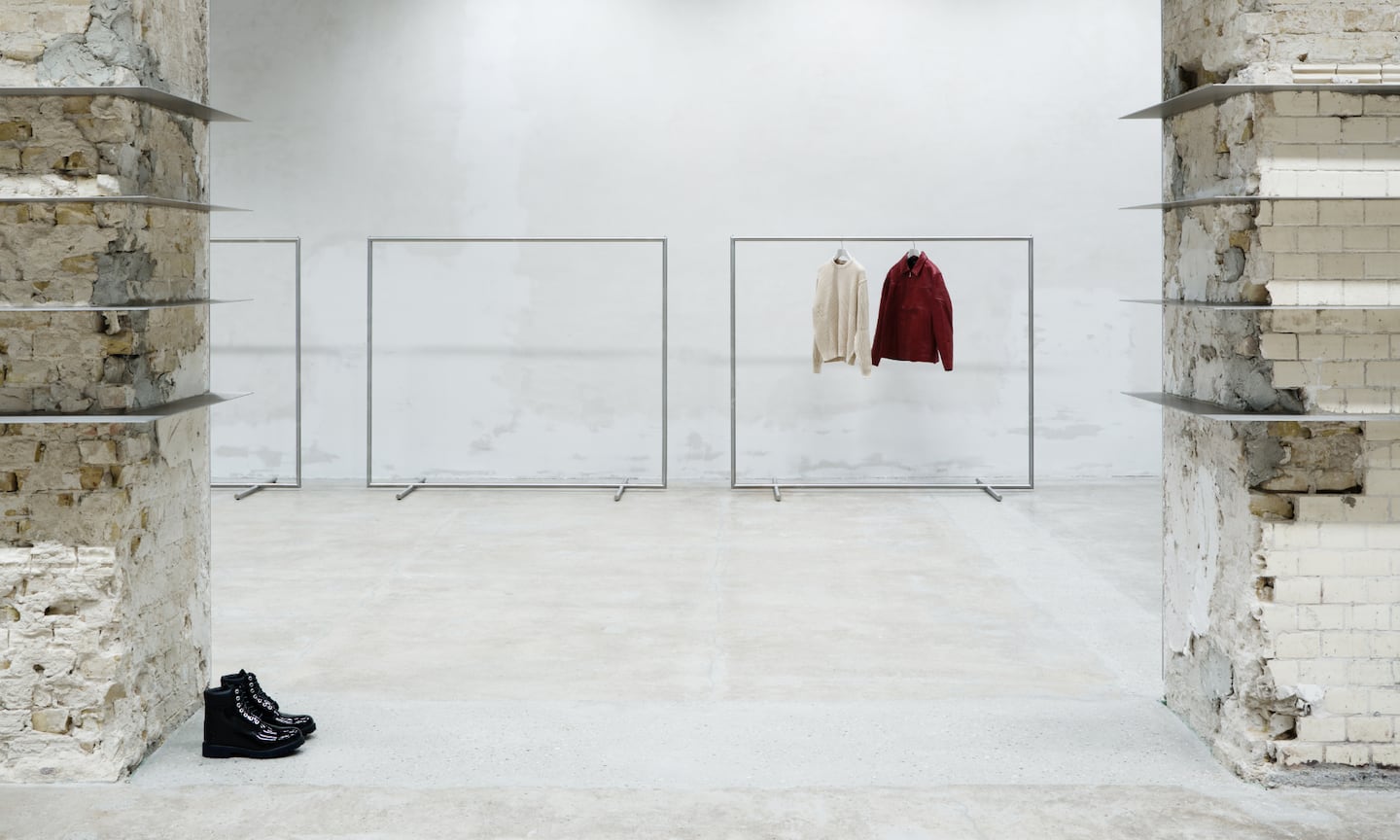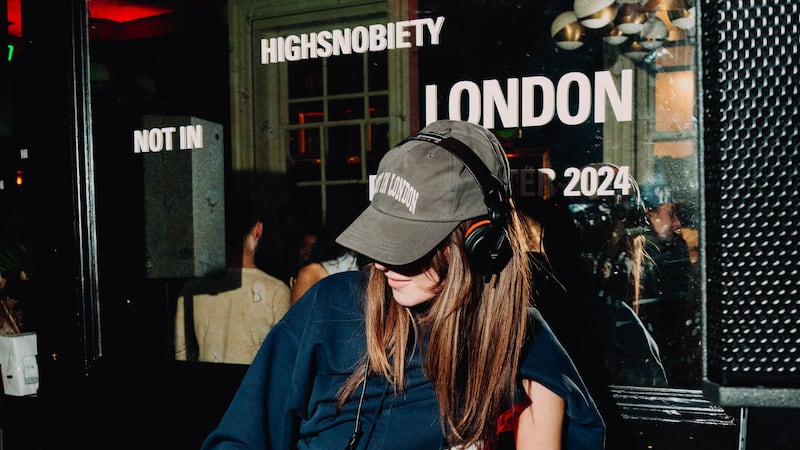
Agenda-setting intelligence, analysis and advice for the global fashion community.

Agenda-setting intelligence, analysis and advice for the global fashion community.

LONDON — On Monday, Romeo Beckham — the son of English football legend David and Spice Girl-turned-fashion entrepreneur Victoria — was passing by Highsnobiety’s “Not in London” pop-up at Selfridges when a certain sweater caught his eye: a pullover designed by London-based brand Knitwrth was woven with old-school paparazzi images of his parents on the front and back.
Beckham tried on the £365 ($460) knit and posted a picture to his four million Instagram followers, tagging his mum and dad — sending the product instantly viral. The spontaneous interaction was the kind of fashion magic that wouldn’t be possible without the physical store.
The buzz validated Highsnobiety’s approach to retail as the company plans to follow up the Selfridges event by opening its first-ever flagship store in Berlin next week.
The store opening on March 1 will stock products from 80 to 100 different brands, across categories including luxury and streetwear clothing, sneakers, beauty, accessories at homeware.
ADVERTISEMENT
Visits from ultra-famous “children of” like Beckham are unlikely to be a regular occurrence — but the youth culture publication, brand consultancy and e-tailer is betting it can create value in a difficult climate for multi-brand retail by generating buzzy moments with a curated cast of brands, hypebeasts and style tastemakers. They may not always buy (or buy a lot) but they post, and brand partners will pay for that.
To make this a viable business opportunity we cannot simply just buy and sell product.
“To make this a viable business opportunity we cannot simply just buy and sell product,” Highsnobiety’s founder and chief executive David Fischer said. “We want the store to be a physical space which we constantly reinvent to bring all our digital projects to life.”
The Berlin opening marks the latest development of the company’s experiments in retail, which in recent years have ranged from opening concept stores in airports to staging fashion week pop-ups in London, New York, Paris and Milan — not to mention a multi-brand e-commerce unit. German retail giant Zalando acquired the company in June 2022, paying around €124 million ($133 million) according to a recent quarterly earnings report.
Zalando has struggled to turn the company’s devoted readership into profitable online sales in a brutal market for fashion’s wholesale boutiques. Multi-brand players both online and in brick-and-mortar fight an uphill battle as they seek to hold onto consumers’ attention, control soaring costs for marketing and logistics and attract top brands, which increasingly prioritise retail. Shares in Zalando have fallen 50 percent in the last year.

But if Highsnobiety’s community isn’t ordering online as much as hoped, the brand hasn’t lost its feel for putting on packed-out parties or generating savvy ideas for co-branded merch (such as its Chiltern Firehouse T-shirts and hoodies, or its hit Highsnobiety x Café de Flore collection).
At the Berlin flagship, Highsnobiety plans to leverage its pop-up store playbook. Beyond selling products — a curated selection from brands like Our Legacy and Acne mixed with margin-boosting private label items — the space is hoped to serve as a gathering point for the city’s streetwear and fashion communities, whom the company bets big brands will pay to reach.
The store will host a packed roster of activations, from launches for its print magazine to events for well-known designers or local cultural institutions (at the London pop-up, for example, the brand even collabed with a beloved local bagel store). The new store’s activations will be calibrated to coincide with high-profile events such as Berlin Art Week in April and the European Football Championships in June, Fischer said — moments which present opportunities to activate specific apparel categories as well as event-specific collaborations and merch, as well as a chance to benefit from increased footfall in the city.
Of course, there are worrying precedents for this sort of immersive retail space. Attempts to revive the model of long-lost concept stores like Colette or Opening Ceremony include the New York flagship of rival streetwear publication Hypebeast, which closed in February just two years after its launch.
ADVERTISEMENT
“Retail is a completely crazy thing ... the news around it is so dark,” said Fischer.
But Highsnobiety is encouraged by the success of its pop-ups, which in three or four days can generate upwards of $150,000 in revenue. Fischer believes the model can be replicated in a permanent store.
“Highsnobiety’s journey from media organisation to pop-up tastemaker has allowed it to put its audience right where its brand collaborators are,” said Alison Farrington, retail trends consultant for The Future Laboratory.
Retail (including e-commerce) accounts for roughly 10 percent of Highsnobiety’s business. The rest is a mix of advertising, consultancy and — importantly — brand partnerships, a part of the business where clients are increasingly hungry for ways to reach new customers in the physical world as well as online.
At the brand’s New York fashion week pop-up last September, for example, brand partnerships’ income ended up being 10 times what came through actual sales. Products on sale comprised New York-inspired Highsnobiety private label clothing, alongside Reebok sneakers and apparel collaborations with partners like Coca-Cola.
The flagship store will provide a location on the company’s home turf in which to bring its signature brand of activations to life year-round, rather than relying so heavily on pop-ups, which are expensive and time-consuming to execute.
“Sometimes brand partners want to do three of four things with us per year, whether that’s a dinner, party, exhibition, or all three — the store gives us the perfect place to do that,” Fischer said.
In addition to being the company’s home turf, the Berlin market stands as a sort of beacon of cool where standard-issue strategies are likely to fall flat. Big brands need players like Highsnobiety or the high-low sports and luxury boutique Voo Store to broker access to sought-after tastemakers.
ADVERTISEMENT
If all goes well, the Berlin location could pave the way for more stores.
“Of course, there’s the ambition to potentially bring this into other cities as well,” Fischer said.
Editors' Note: This story has been modified 23 February, 2024 at 10am BST. A previous version stated that physical retail accounts for 10 percent of Highsnobiety's business. That is incorrect. The 10 percent figure also includes e-commerce sales. A previous version also incorrectly characterised the role of Zalando in Highsnobiety's e-commerce operations, which are operated independently from the site's owner.
Small stores can remain competitive by scaling their private labels, testing new store concepts, and offering brands consumers can’t find on Farfetch or in Selfridges.
The German fashion e-tailer has taken a majority stake in the high-end streetwear platform in a bet on the combined power of content and commerce.
The publisher will bring its youth-centric POV to the beauty space with a dedicated section, launching Feb. 2.

Daniel-Yaw Miller is Sports Correspondent at The Business of Fashion. He is based in London and covers the intersection of sports and fashion, as well the sportswear and sneaker markets.
Adidas has mounted one of the more remarkable turnarounds in recent memory after facing a crisis two years ago from the end of its Yeezy business. BoF spoke to chief executive Bjørn Gulden and other members of Adidas’ leadership to unpack how a series of bold decisions on products like its Samba sneaker, a move to refocus the brand on athletes and internal shifts brought Adidas back from the brink.
In 2024, US shoppers spent more than $14 billion online during Amazon’s 48-hour Prime Day sale. Here, Front Row’s Alexandra Carmody shares how Deal Day strategies can drive lasting success beyond immediate sales spikes.
A slew of brands should report strong results even amid an unpredictable economy and slumping luxury sales.
The dream of creating an American answer to LVMH and Kering faced a major setback this week after a federal judge championed the Federal Trade Commission’s narrow definition of the sub-luxury handbag market.